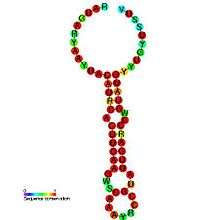Enterovirus cis-acting replication element
Enterovirus cis-acting replication element is a small RNA hairpin in the coding region of protein 2C as the site in PV1(M) RNA that is used as the primary template for the in vitro uridylylation.[1][2] The first step in the replication of the plus-stranded poliovirus RNA is the synthesis of a complementary minus strand. This process is initiated by the covalent attachment of uridine monophosphate (UMP) to the terminal protein VPg, yielding VPgpU and VPgpUpU.
| Enterovirus cis-acting replication element | |
|---|---|
 Predicted secondary structure and sequence conservation of Entero_CRE | |
| Identifiers | |
| Symbol | Entero_CRE |
| Alt. Symbols | CRE |
| Rfam | RF00048 |
| Other data | |
| RNA type | Cis-reg |
| Domain(s) | Viruses |
| SO | 0000233 |
| PDB structures | PDBe |
References
- Paul AV, Rieder E, Kim DW, van Boom JH, Wimmer E (November 2000). "Identification of an RNA hairpin in poliovirus RNA that serves as the primary template in the in vitro uridylylation of VPg". Journal of Virology. 74 (22): 10359–10370. doi:10.1128/JVI.74.22.10359-10370.2000. PMC 110910. PMID 11044080.
- Goodfellow I, Chaudhry Y, Richardson A, Meredith J, Almond JW, Barclay W, Evans DJ (May 2000). "Identification of a cis-acting replication element within the poliovirus coding region". Journal of Virology. 74 (10): 4590–4600. doi:10.1128/JVI.74.10.4590-4600.2000. PMC 111979. PMID 10775595.
External links
This article is issued from Wikipedia. The text is licensed under Creative Commons - Attribution - Sharealike. Additional terms may apply for the media files.